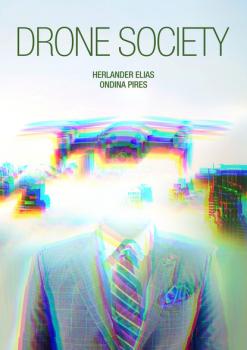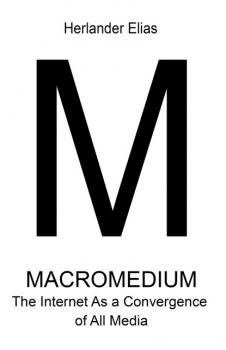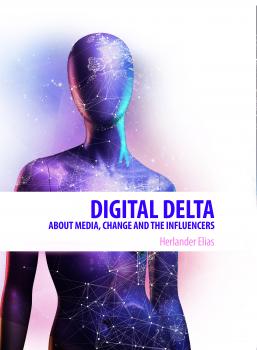ТОП просматриваемых книг сайта:
Herlander Elias
Список книг автора Herlander EliasАннотация
Drone Society addresses political and war conflicts in the year 2035, from the fictional point of view: a society of social and economic extremes; surveillance drones that spread terror; a technological world in which Artificial Intelligence, paper-eating viruses, conspiracies and weaponry of all kinds are used by the mega-powerful China and America in the name of eternal classics of human existence ― money, hatred, power hunger, egocentrism versus resilience, idealism and loyalty of some humans. Will drones and robots beat humanity? Be aware! Drone-brother is watching you!
Аннотация
There is an on-going transformation regarding how digital media, especially the web, have evolved. In this new context of ours all media is converging into a massive super-medium. That is the macromedium, a medium encompassing the online, computing, networks, clouds, servers, mobile media, and more. What is interesting from a consumer-user point of view, is that now all we have access to is in one place. No more complication. The digital space is becoming one system that demands our usage and attention, regardless of formats, languages and design. This convergence is inevitable.
Аннотация
In The Complete Men School, Herlander Elias tells us the story of two journalists (Rafael Sterling and Roberta Wagner) who do together the best news report of their lives by disclosing a subculture of benefactors known as “The Complete Men School”.<br /><br />The plot progressively leads the reader into philosophical dialogues between a Master and his Apprentices who attend one of the secret ‘Schools’. Rafael, the young protagonist, is longing for the elaboration of a motivational research and that is the moment in which he comes across with a ‘one in a lifetime adventure’ reaching for unknown areas. He discovers a fascinating legion of aesthetes for whom humanity is deprived of privileges only reserved for a few elites, turning them into puppets in the hands of rulers, manipulative media and big companies. The 'dialogue' presents itself the chosen weapon of ‘freedom ’ to change the world.<br /><br />Over more than ten chapters, the reader also steps into this ‘School’ getting to know who the “Complete Men” are, how they act and what is their agenda. In this fiction work, the reader will attempt to decipher riddles and solve problems the same way the Apprentices who aspire to become the ‘Complete’ ones do: how they can learn to grow up in life as human beings and to choose the way of fullness.<br /><br />Crossing-over philosophy and detective story, this novel is filled with unanswered questions that guides the reader to meet the line of thought developed by the ‘Complete’ ones. Their elegant looks, their skepticism, their post-romantic boldness, yet always trying to act in a low profile way is the outline of the 'Complete' ones behavior. This wise attitude allowed them to change for good the communities that suffered their intervention. But if you want to know more about what a 'Complete Man' is, your best shot is reading this book.
Аннотация
This is a book about the future and the present as well. Today there is a new configuration. We are a cybernetic man, a homo cypiens, a smarter, more agile forward thinker and a digital media user foremost. In this book we examine digital culture, our post-everything era, the impact of mobile media and how relevant it is this new post-computer generation. Also we think of the cloud, the Internet and all digital media as being main players in establishing something that could be called «the macromedium», i.e., the medium of all media.
Аннотация
The cloud changes the game when it brings the logic of the network for commercial domination and it spreads the motto of the computer as terminal for streaming. Thinking beyond this is to realize that what «died» here was the computer. Without our daily digital media the cloud makes no sense. We may be in a hybrid point in some cases, but the cloud is more than a trend, is a macro-event of significance and a macro-fact. However, we can still rely on the idea of Sterling and Gibson, who in the 1980s knew the computer would become more than a object of glamour and sophistication. The computer was from the start meant to be pure network, thus the cloud, and here comes a new wave of new things and the way people changed for using the digital media over the last 20 years. In the time of the cloud, the new heroes are the cloud punks.
Аннотация
In agreement to author Mark Tovey, «hypertrail» (2008, xxxii) is the moment in which there is too much dialogue between brand and consumer, user and technology, meaning that people leave a historical and digital trail behind when sharing or searching data in the Internet. «Hypertrail» is also the focus of our research. We are facing a new era of networking and smart devices where brands we engage to dialogue with are the ones that connect and keep in touch with us ― they track us and anticipate every move of ours, meaning this we cannot flee from the huge trail we leave behind on the networks, websites and apps. As Tovey speaks about, we rely on the hypertrail, we track the brands and in return, they track us. Besides, brands are aware that we use our smartphones as complete devices for all facts in our lives and that nowadays we are all synchronized. This day and age is what Lipovetsky & Serroy call «hypermodernity» (2013, 13). Furthermore, this is the modernity in which digital media is being used to push us further in technology, science, information and consumerism. Never before has the system known so much about ourselves. In addition, there is more up to it. Without previous instance, have we confessed so much detail about our lives and shopping habits as we do online by giving up our privacy in order to use digital systems. What defines the online media is that is often «hypertextual or hypermediated» (Miller, 2011, 25), meaning that the digital media are context-aware of us and they rely on crossing information about us, thus anticipating every move of ours. Some authors, such as Turkle, prefer to label this media as «narcissistic devices» because we use them as mirrors of our own personality. We shop online, too. Therefore, we are «in» without noticing we do many different things in a «virtual» space without thinking very much as we used to in the past. Events, concepts, facts and actions just happen all the time and we go with the flow. We use special smartphones as extensions of who we are, and of how we think and behave. Whenever we take selfies, we are objectified in representations (Leurs, 2015, 192). This occurs because we do not care about the kind of trail we leave behind ― algorithms digest all our photos and web searches. We came to build a hypertrail online independently we are or not aware of that.
Аннотация
"On the cover there is a subtle mixture of warm and cold colors. On the face of the humanoid figure there are warm tones and cold tones on one side that spread throughout his body and his aura. The coldness of the machines and the digital mix with the warmth of life and the human. And the simultaneity of these characteristics that belong to us, defines us. We are human in a paradoxical route: we live emotional relationships with immaterial information coming from digital media. This reality permeates our entire material body. Hot and cold. We are also hyperconnected with countless people and information but, at the same time, we are alone. We are individuals with no defined identity in an information network with various social networks whose appearance changes according to the presence we want to mark in these territories. The connections of this digital universe, these nodes that make up the links on the Internet, are like the synapses of our neurons that control our bodies. We are not androids, we are not human-machines, we are not cyborgs, we are only humans. Technology is not yet materialized in us, it is inscribed in our contemporary way of being. This constellation of digital information is tacitly imprinted on our bodies. We are digitally influenced and digital influencers. We have multiple identities. We are physically impermanent, but the information we share online has the possibility of being accessible for centuries or even millennia. Our assets in this digital logic have no mass; we cannot touch the subscriptions and files that we accumulate. Nothing is permanent and changes are inevitable. Even the speed at which transformations take place is not constant. That is why Digital Delta is an urgent and indispensable book to understand the changes that we are going through in this reality that is physically and digitally constructed."







